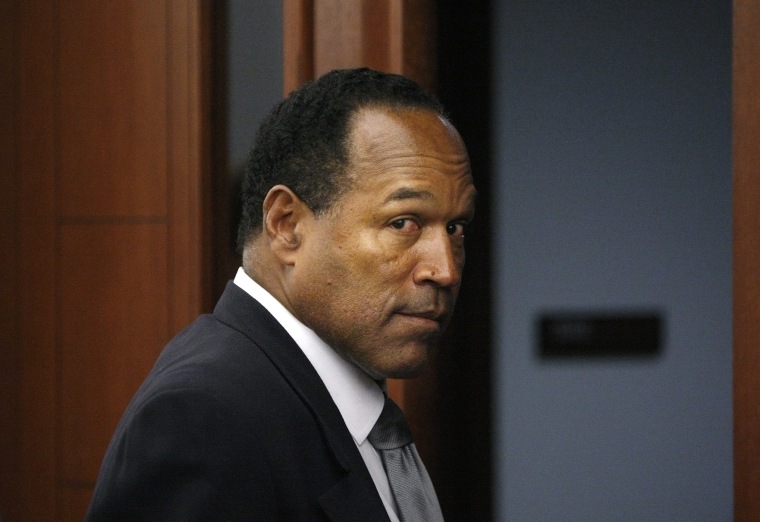As the reviews roll in for Ryan Murphy's new "American Crime Story" series, the first season of which re-examines the O.J. Simpson trial and the media circus around it, there has been renewed interest in the case that infamously highlighted America's racial divide.
More than twenty years after Simpson's acquittal in the murders of his ex-wife Nicole Simpson and her friend Ron Goldman polarized the country, public opinion has evolved dramatically, particularly along racial lines. According to a Washington Post-ABC News poll published last fall, by the time the African-American NFL Hall of Famer was found liable for the crime by a civil court jury in 1997, a whopping 82 percent of white Americans were convinced of his guilt, while only 31 percent of black Americans concurred. Today, the percentage of whites who believe Simpson was guilty has held steady at 83 percent, but the number has consistently risen in the black community, hitting an all-time high majority of 57 percent last year.
The racial evolution of thought on the O.J. Simpson case may be one of the most striking aspects of the story as it begins to be retold in the form of an FX miniseries. The film, which has earned rave reviews for its attention to detail and engaging performances, reportedly puts an emphasis on how race, for better or worse, shaped the trial and its outcome from almost the very beginning.
RELATED: Watergate becomes the latest national scandal recreated for TV
Coming on the heels of a controversial crime bill signed into law by former president Bill Clinton, which was viewed as disproportionately detrimental to communities of color, as well as the Rodney King beating and subsequent Los Angeles riots in 1992, the Simpson trial, as far as many African-Americans were concerned, was the culmination of decades of disrespect.
"The O.J. Simpson trial was for many black people less about O.J. Simpson, but instead the frustration we were having with the criminal justice system," David A. Wilson, the co-founder and editor in chief of the African-American news website theGrio told MSNBC on Monday. "We sort of mobilized behind O.J. Simpson, not for his sake, but for ourselves and our communities. It wasn’t about the facts of the case, it was about the system that they felt demonized and persecuted black men disproportionately."
Simpson, with his considerable wealth and wholehearted embrace of the white community, was viewed as somewhat detached from his roots within black America (the miniseries' trailer features Simpson, played by Oscar winner Cuba Gooding Jr., arguing, "I'm not black ... I'm O.J."). And yet, when accused of double murder, he sought refuge and redemption among his people and in turn became a proxy for an aggrieved population to strike back at a power structure they believed never had their best interests at heart.
According to Wilson, when Simpson was found not guilty, there was an feeling of schadenfreude among many African-Americans. "I remember when I was in college and the verdict was read. I remember the frustration and befuddlement of so many of my white peers. And I remember a feeling of contentment about that. Now they finally understand what it feels like," Wilson said.
Wilson argues that the Simpson case, played out on the national stage, represented one of the first times where the justice system did not deliver the result the majority of white Americans wanted, becoming a teachable moment for the country.
Today, the black community has other, more relatable figures -- Trayvon Martin, the unarmed African-American teenager whose killer was acquitted, is one -- who are perceived as victims of police misconduct or judicial railroading. Simpson's status as a vessel for retribution has faded. And his willingness to participate in an "If I Did It" book project, his oft-promised "search for the real killers" that never seemed to materialize and various run-ins with the law since his acquittal -- one of which has landed him in prison, where he is currently serving a 33-year sentence -- have not helped his image, either.
When BET entertainment editor Clay Cane watched the trial unfold as a youth in Philadelphia, he found that most of his black peers didn't necessarily believe in Simpson's innocence, but did see his trial as an "example of a black man who got one over on the criminal justice system -- more of a comeuppance."
"So many African-Americans had been beat down, they were OK with him getting away, even it if was murder, " he told MSNBC on Monday. Cane says that while people must not forget that two people tragically and brutally lost their lives, that the black community's reaction to the trial was complex and should not be easily dismissed. "Part of why folks were celebrating O.J. being found innocent was because so many of their brothers, fathers, cousins and uncles were locked up in jail," he said.
Frustration with police practices and racial disparity in sentencing has not dissipated since the Simpson trial. In fact, some could argue that in the age of the Black Lives Matter movement, tensions grown even more pronounced. But, one could also make the case that the water cooler conversations the trial inspired, which predated social media, laid the groundwork for the more frank discussions on race that would follow in its wake.
The myriad lingering issues surrounding the Simpson case -- not just celebrity, but the subject of black fame that also factors into the Bill Cosby allegations-- should make the "American Crime Story" series, and other planned Simpson projects, especially relevant.
"In many ways the O.J. Simpson trial is not really about O.J.," said Cane. "It really is a time capsule for the way we looked at race in this country -- the way we ignored it and the way it couldn’t be ignored. It was a collision of all these intersections [of race, fame and wealth] and twenty years later we still haven't managed to connect those intersections."
